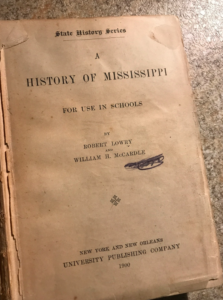
When Kate Medley and I visited Larry McCluney Jr. in his Greenwood home for our Guardian story on people who like or fly the Confederate flag, the Sons of Confederate Veterans officer mentioned his favorite Mississippi history textbook several times. After the interview, he showed us his worn copy of the 1900 textbook, “A History of Mississippi: For Use in Schools” by Robert Lowry and William H. McCardle published by University Publishing Company of New York and New Orleans. McCluney now teaches history to mostly black students in Greenwood High School and at a Delta community college, both of them public.
I was immediately skeptical that a 1900 textbook about Mississippi would give an accurate depiction of the South’s reasons for secession, fighting the Civil War and what really happened during Reconstruction, knowing full well that my textbooks in the 1970s in Mississippi didn’t. I confirmed that suspicion when I poked into the book later and read up on its writers and critiques of it.
First, the authors. Charles W. Eagles reports in “Civil Rights, Culture Wars: The Fight over a Mississippi Textbook” that Lowry—who then lived in Brandon, Miss., and later Jackson—was wounded in the Battle of Shiloh during the Civil War and rose to the rank of general. Later, he served in the Legislature and two terms as governor. McCardle was the editor of the Vicksburg Times newspaper who was jailed for sedition for criticizing Congress and the way a local Union military commander was conducting Reconstruction in Mississippi. He was denied the benefit of habeas corpus in the Ex Parte McCardle case.

Perusal of the 1900 textbook itself and Eagles’ book shows that the text was romantic and revisionist, at best, toward the South before, during and after the Civil War. “Though they mentioned the creation of nearly every county and of every Indian treaty, the authors paid scant attention to slavery and made no racial distinctions when they reported the state’s population,” Eagles wrote. The authors did, however, fixate on “wartime courage and heroism” and decidedly did not echo Mississippi’s Declaration of Secession’s honesty about slavery being the central cause.
“For Lowry and McCardle, Mississippi’s devotion of constitutional principles explained secession. During the war slaves completely sympathized with whites and ‘rejoiced with them in their victories and mourned with them over their defeats,'” Eagles wrote, quoting the textbook.
It was only during Reconstruction when the Freedmen’s Bureau gained influence over former slaves that they were “alienated from the people with whom they had lived,” the textbook teaches, thus ignoring the slaves who had long been, in fact, “alienated” from their owners or who had joined up with the Union army.
Clearly, the two men who wrote this textbook had their own motives—and it was decidedly not giving a complete and honest accounting of what led to southern secession and the Civil War or realities of the Reconstruction that followed.
I would like to see an effort to stop McCluney from teaching. I want the public to know all, so they might see & stop ignorance & abuse.
Today, I saw on the front page of the Clarion Ledger an article detailing the murder of a 15-year old black boy in 1950. Eight white teenage boys drove into his neighborhood & shot him down. He died the next day.
One pleaded manslaughter & served one year in prison. An 18-year old received nothing. If I remember correctly, the other six boys may have had something like probation—nothing more.
The murdered boy’s sister was interviewed for this article.
I ask you if you would research this matter & ,perhaps, help bring the other seven boys some jail time; if, nothing else, I want the accused to be put on display. It is something we all need to think about.
Anyway, I can help matters, please, let me know.
I’m not popular nor am I likely to please others, so I have no desire to be in the spotlight; people won’t follow my lead. That’s why I give info to others. I want things that are problems to be solved. I want a better life for myself & everyone else in this world.
Thank you for all you do; you are a light for our world.
And? What is the reader to take away from this article? Slavery is bad? Men who fought in the Confederacy loved their cause above all else? That they were racist? That the man who owns the book is racists and bad? What the message here? All I can gather is a character attack against 2 men who wrote the book roughly a century ago. Please give some clear indication as to your motives about this piece.
Thank You
David
You can take away what you like. The point of the post was to look closer at the very old (and revisionist) Mississippi history that McCluney showed me, proudly saying that it’s his favorite. He is, you may recall, both a high-school and a college history teacher.